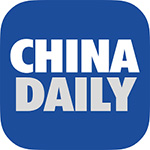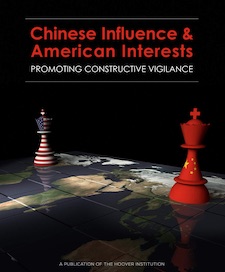 |
While president Trump ridicules reporters and declares the media the "enemy of the people," China is spending millions to fortify its media and overseas propaganda institutions in a bid to promote its image in the US and throughout the world, according to a study released last month by the Hoover Institution.
"While Americans are well acquainted with China’s quest for influence through the projection of diplomatic, economic, and military power, we are less aware of the myriad ways Beijing has more recently been seeking cultural and informational influence, some of which could undermine our democratic processes," reads the 191-page report called, "Chinese Influence & American Interests: Promoting Constructive Vigilance."
It contends "China’s influence activities have collectively helped throw the crucial relationship between the People’s Republic of China and the United States into a worrisome state of imbalance and antagonism."
 |
That campaign comes as US media are slammed as "fake news" and under financial siege from both advertisers and the Internet.
The Chinese Government, in turn, stepped up its "grab the right to speak" effort from western media and independent Chinese-language outlets, which it claims distorts news about China and sullies the country's image.
The public policy think tank reports that state-owned Chinese media companies have established a significant foothold in the US in print, radio, TV and online.
China's main English-language newspaper, China Daily, has opened offices throughout the US. It also gains influence by lavishly funding its China Watch propaganda inserts in top American outlets like the Washington Post and Wall Street Journal.
The Stanford University institute notes that it's often difficult to tell that material from China Watch is just propaganda for the PRC. For instance, Trump highlighted a China Watch piece that ran in the Des Moines Register as "real news," according to Hoover.
Meanwhile, China's government has "severely limited the ability of US and western media outlets to conduct normal newsgathering activities within China, much less to provide news feeds directly to Chinese listeners, viewers and readers in China."
The country also has stepped up efforts to silence critical voices in the Chinese-American community, by dispatching officials to the US to pressure them or family members living in China.
Hoover calls on the Trump administration to demand reciprocity for American journalists attempting to do their professional work in China. "To the extent that they are prevented from doing so as a result of visa denials and restrictions of access, the US State Department should respond in kind by restricting visas and access for Chinese journalists in the United States," says the report.
Hoover recommends that media advancing the Chinese government line be required to register under the Foreign Agents Registration Act. It suggests that employees of "these organizations should be given a disclosure package making them aware that they are working for a foreign agent institution."
The US also should help independent Chinese media survive by "using grants via the Fulbright program or other vehicles, such as the State Department International Visitors or Speakers’ Bureau."
Domestically, the US should aid independent Chinese-language media through manufacturing credits for printing press operations, and nonprofit tax designations to allow journalism business models to survive the current transitional crisis."
Hoover stresses the need "to strike a balance between passivity and overreaction, confidence in our foundations and alarm about their possible subversion, and the imperative to sustain openness while addressing the unfairness of contending on a series of uneven playing fields."


 The NBA, which promotes legalized gambling 24/7, seems more than hypocritical for banning player for placing bets... Diocese of Brooklyn promises to issue press release the next time one of its priests is charged with sexual abuse... Truth Social aspires to be one of Donald Trump's iconic American brands, just like Trump University or Trump Steaks or Trump Ice Cubes.
The NBA, which promotes legalized gambling 24/7, seems more than hypocritical for banning player for placing bets... Diocese of Brooklyn promises to issue press release the next time one of its priests is charged with sexual abuse... Truth Social aspires to be one of Donald Trump's iconic American brands, just like Trump University or Trump Steaks or Trump Ice Cubes. Publicis Groupe CEO Arthur Sadoun puts competition on notice... Macy's throws in the towel as it appoints two directors nominated by its unwanted suitor... The Profile in Wimpery Award goes to the Ford Presidential Foundation for stiffing American hero and former Wyoming Congresswoman Liz Cheney.
Publicis Groupe CEO Arthur Sadoun puts competition on notice... Macy's throws in the towel as it appoints two directors nominated by its unwanted suitor... The Profile in Wimpery Award goes to the Ford Presidential Foundation for stiffing American hero and former Wyoming Congresswoman Liz Cheney. JPMorgan Chase chief Jamie Dimon's "letter to shareholders" is a must-read for PR people and others interested in fixing America and living up to its potential... Get ready for the PPE shortage when the next pandemic hits... Nixing Netanyahu. Gaza carnage turns US opinion against Israel's prime minister.
JPMorgan Chase chief Jamie Dimon's "letter to shareholders" is a must-read for PR people and others interested in fixing America and living up to its potential... Get ready for the PPE shortage when the next pandemic hits... Nixing Netanyahu. Gaza carnage turns US opinion against Israel's prime minister. Trump Media & Technology Group sees Elon Musk's X as an option for those who want the free expression promised by Truth Social but without Donald Trump, owner of 57.3 percent of TMTG... Chalk one up for "anti-woke warrior" governor Greg Abbott as University of Texas lays off 60 DEI-related staffers... Five percent of Americans see the US as its own worst enemy, according to Gallup.
Trump Media & Technology Group sees Elon Musk's X as an option for those who want the free expression promised by Truth Social but without Donald Trump, owner of 57.3 percent of TMTG... Chalk one up for "anti-woke warrior" governor Greg Abbott as University of Texas lays off 60 DEI-related staffers... Five percent of Americans see the US as its own worst enemy, according to Gallup. Nine of the Top 100 firms that participated in O'Dwyer's rankings last year apparently threw in the towel for the 2024 scorecard. Seven other firms also went AWOL.
Nine of the Top 100 firms that participated in O'Dwyer's rankings last year apparently threw in the towel for the 2024 scorecard. Seven other firms also went AWOL.


 Have a comment? Send it to
Have a comment? Send it to 
No comments have been submitted for this story yet.